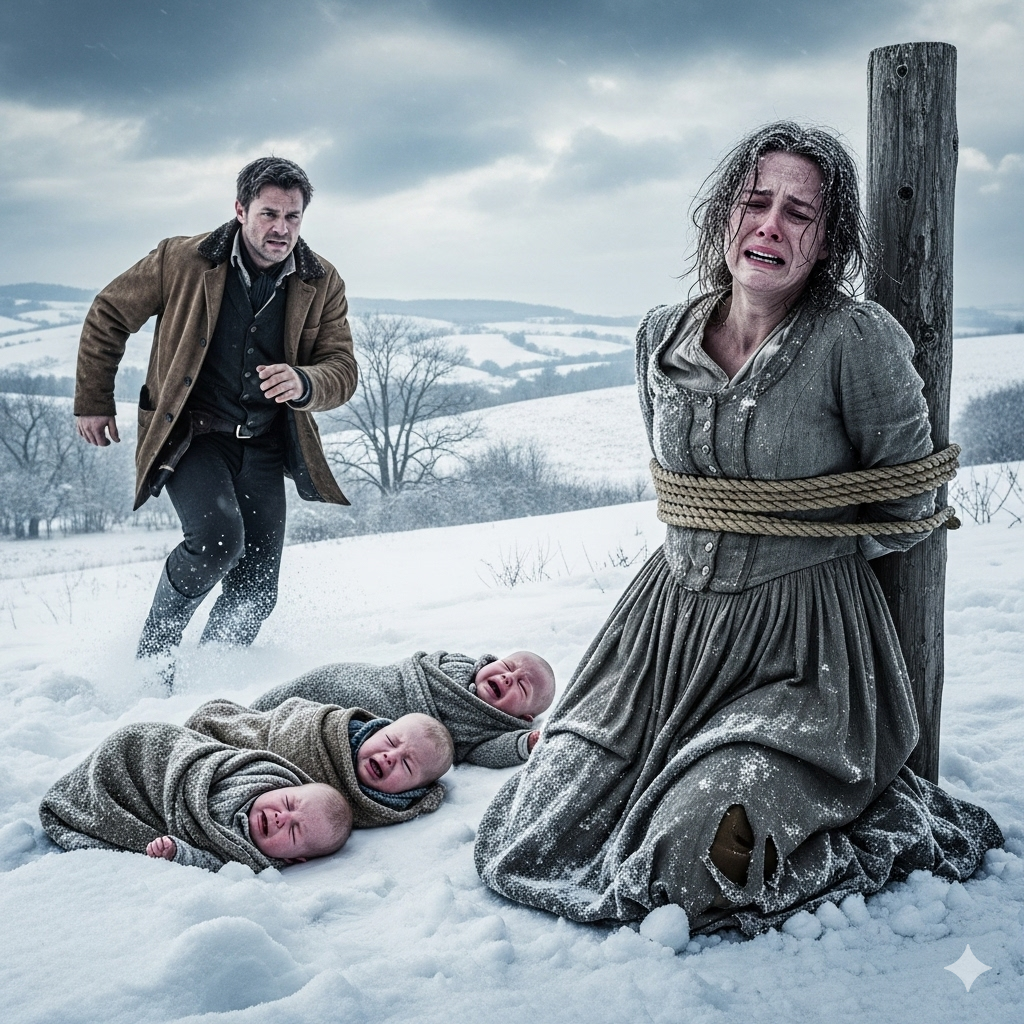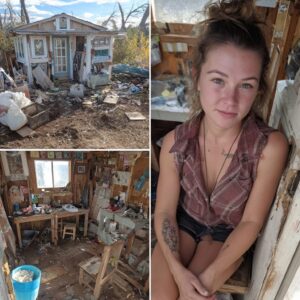
Based on a true story, Assisted by Ai
The Hearth at Granger Ridge
Wyoming Territory, late January 1877.
On the high ribs of the Snowhorns, the wind hunted the ridgelines like a wounded beast. But the first sound Silas Granger heard wasn’t the gale—it was a thin, bright cry that pierced the pines.
He reined in. Snow squeaked under iron. Another cry followed, then a second, then a third—small, urgent, alive. Silas swung off the saddle and led his horse up a narrow track that cut the timber like a scar. Each step sank him ankle-deep. Breath steamed, ears pricked. The wind muttered; the babies didn’t.
He found the clearing by an old fence post, half-rotted, half-buried under drift. A woman was lashed to it with barbed wire, arms pinned behind her, flesh torn where rust bit. Snow frosted her lashes; her hair had frozen in ragged strands. At her boots lay three bundled infants wrapped in a shredded nightgown—one mewling weakly, two gone quiet.
“Don’t let them take my daughters,” she whispered.
Silas went to his knees. He checked the babies—skin cold, breathing shallow, but steady—and looked up at the woman whose face was the color of old linen except where bruises spread like spilled ink.
“You’re coming with me,” he said, quiet and sure.
His boot knife flashed. Wire snapped free and the woman sagged. She didn’t scream when the barbs tore loose; she didn’t have the strength. Silas caught her, lifted her as if she were made of paper, then gathered the babies one by one and tucked them beneath his coat with a wool blanket from the saddle.
They had half a mile uphill to his cabin. The wind slashed. The horse sidestepped, ears flat.
“You don’t die here,” Silas told the cold, or God, or maybe the woman whose weight was next to nothing. “Not on my land.”
He carried them home through a world of white.
The cabin was four walls and a sloped roof groaning under snow. The hearth was dead. Silas kicked the door wide, set the woman on a bed of quilts by the cold firebox, and settled the infants into a basket lined with rabbit pelts. Then he worked—wood, tinder, breath, spark—until the hearth caught and the room breathed again.
He warmed goat’s milk in an iron pot and fed the babies by wooden spoon: tiny sips, clumsy at first, then greedy. He cleaned the woman’s legs with a warm cloth, rinsing blood from scraped knees and mean bruises laid deep by a heavy boot. She slept like the dying sleep—thin, even, stubborn.
When she finally stirred, her voice was a rasp: “Marabel. Marabel Quinn.”
“Silas,” he said.
Her gaze slid to the basket. One of the girls sneezed. Marabel’s eyes brimmed, but her body was too broken for sobbing. Silas tucked an elk-fur cloak beneath the babies; its warmth held.
By the second dawn, color crept back into Marabel’s face. The girls—Eloise, Ruth, and June—woke hungry and loud, which was the purest kind of mercy.
Silas didn’t ask questions. Silence, in its way, was a kindness. He sharpened a knife on a wet stone, and the cabin settled around the simple facts of fire and breath.
When Marabel did speak, the words came iron-thin. “I was seventeen when my father married me to Joseph Quinn. He was thirty-four and rich. Said I was lucky.”
Silas kept the stone moving.
“The first daughter, he frowned. The second, he stopped speaking to me. The third,” her voice frayed, “he called the midwife a witch who’d cursed my womb. Said I was a mule if I could not give him a son. He and his brothers beat me. Then he tied me to that fence and left me for the snow. He called it justice.”
Silas set the knife down and went to her. He took her swollen hand as gently as if it were glass. “Here,” he said, and the word felt like a post driven into bedrock, “your girls are the only thing worth feeding.”
Something in the room re-aligned—the smallest tilt of gravity toward hope.
When spring began to gnaw at the drifts, trouble rode the switchbacks. Hattie Boyd came first, cheeks wind-burned, shawl green with snow.
“It’s about her,” Hattie said. “Joseph put out word. Says Marabel’s unstable, ran off, and he’s sending men to bring her and the babies ‘home.’ Four riders. Don’t look like a church party.”
Silas only nodded. Hattie left them a pouch—lentils, jerky, a flask—and thundered back down the ridge.
Silas worked without talk: mending a rear latch, bracing the door, stacking wood inside, shifting supplies to the root cellar. He kept his hunting knife honed to a whisper.
The morning they came, the air went too quiet. Even the birds held their tongues. Three riders ghosted through a thickening snow—wide-brimmed hats, low shoulders, eyes like winter steel. Joseph Quinn rode in front, handsome and polished the way a blade is handsome and polished.
“Silas Granger,” he called. “We come with claim.”
“You don’t,” Silas said.
“That woman inside is my wife. Those girls are mine by right.”
“She was never yours,” Silas said, unarmed, voice calm as a level. “And they sure as hell aren’t.”
Joseph’s jaw ticked. He drew a pistol. One of his men stepped forward and cracked Silas across the shoulder with a rifle butt. The blow dropped him to a knee; blood welled dark against the drift.
“Last chance,” Joseph said.
“Then shoot me,” Silas told him.
“Drop it,” a new voice rang from the trees, hard as a bell. Lanterns bobbed through the storm. Sheriff Mather rode out with two deputies, rifles leveled. Behind them stepped Marabel, cloak torn, face pale but set like a whetstone.
“Tell them what you did,” she said to Joseph, clear and hoarse, “or I will.”
The Sheriff didn’t wait for lies. “Arrest them.”
Iron closed on wrists. Horses snorted and shifted. Joseph’s protests were all spit and no aim. The deputies dragged them downhill into the white.
Marabel ran to Silas. Blood soaked his shirt, but his eyes were steady.
“You’re not dying,” she said, bracing her palm to his wound. “Do you hear me?”
“Wasn’t planning on it,” he grunted, and—because stubborn men are allowed one softness—smiled when she cried and laughed in the same breath.
The worst of winter let go. Skin healed. Memory didn’t, not fully, but it learned to live beside the fire.
They rebuilt together. Silas pushed out the east wall and laid a broader hearthstone; Marabel painted the shutters a weathered green from an old tin Hattie rustled up in town. Word traveled up the trade trail that you could get a bowl of hot stew and a safe night’s sleep below the second switchback. Riders started calling the cabin the Hearth at Granger Ridge, and the name stuck the way warm bread sticks to your ribs.
Silas hunted, split wood, kept the peace without raising his voice. Marabel cooked simple food that made men sigh—venison stew, root hash, sweet cornbread drizzled with honey. The girls fattened from sparrows to thrushes. Eloise walked first. Ruth’s first word was “fire.” June learned to sing before she learned to argue.
One night, above their sleeping nests, Marabel found three cedar plaques, oiled and hung with care, each carved with a name: Eloise. Ruth. June. She covered her mouth with her fingers and let herself cry without breaking.
Peace took root by inches. Marabel taught local children to read with chalk and charcoal. Some walked five miles for letters, and stayed for a song. Every evening the hearth was lit on purpose—not because the cold could kill them anymore, but because they remembered that it once had tried.
On a gold evening in late spring, after the last traveler left and the girls fell to sleep tangled in quilts and burrs, Marabel stepped onto the porch with two tin mugs. Silas sat in the dusk sanding a rough plank.
He reached into his satchel and drew out a shawl, thick-woven, dyed deep burgundy, its border stitched with small, careful thread. In one corner: three initials—E, R, J—and beneath them a single word: WORTHY.
“You made this?” she asked.
“For you,” he said. “Because you are.”
Her breath hitched. “You chose us,” she said softly. “When it would’ve been easier to walk away.”
He didn’t answer with talk. He took her hand—large, scarred, gentle. That night they traded vows the way mountain folk do: with firelight and promises, no rings, no witnesses, just a string of carved beads for the girls’ wrists and a hand laid open for a life.
Summer laid itself down in green. The Snowhorns turned soft around the edges, violets licking up between stone. The Hearth at Granger Ridge became a quiet legend—men came hungry and left fed in more ways than one. They’d sit at the rough-hewn table with pine-needle tea and listen to children’s laughter run across the yard like creek water.
One evening, the sky went honey-lavender, and stars pricked through like awls. Silas sat with a basket of green beans at his boots. Marabel pressed her palm to his and watched their daughters whirl in a patch of last light.
“This fire between us,” she said.
“It never went out,” he finished.
“It just needed a place to live,” she said, and he smiled with his eyes.
People passing the ridge would never hear the storm’s first cry or see blood in the snow or know what it cost to carve three names in cedar. But they’d catch the way she looked at him and the way he looked back, and the way three little girls laughed in a yard that used to be a battlefield, and they’d understand: some houses are framed in timber and some are framed in stubborn, beautiful love. The kind that outlasts a winter and stays.
If this story found you in the cold and gave you a little warmth, ride back any time. There are more hearts on the frontier worth feeding—and more fires waiting for a place to live.




